This blog is now closed. Our coverage continues here.
Mexico hails 'good indicator' of recovery in jobs; US FDA approves new cheaper saliva Covid test - as it happened
Mexico hails a recovery in jobs but will need up to 200m coronavirus vaccine doses; Algeria and South Africa start to relax lockdown restrictions; Malta reports highest-ever one-day rise in cases
- ‘Go hard, go early’ – now New Zealand goes back to the drawing board
- Calls for nationwide sickout as Arizona district cancels reopening of schools
- Dog gone: Australia’s rescue pet shelters emptied by surge in demand during pandemic
- Flu and Covid: winter could bring ‘double-barrel’ outbreak to US, experts say
Sat 15 Aug 2020 19.35 EDT
First published on Fri 14 Aug 2020 19.29 EDT- Summary
- FDA approves use of new cheaper saliva Covid test
- Malta records record daily increase in new infections
- Turkey reports highest increase in new cases since June
- France records over 3,300 new cases in one day
- Ireland reports highest daily rise in infections since May
- UK records over 1,000 new cases for fifth consecutive day
- Russia has started manufacturing its controversial new vaccine
- Main developments so far today
- Seoul tightens restrictions as South Korea records highest Covid-19 cases since March
- New Zealand authorities investigate whether outbreak could be linked to Victoria
- One new Covid-19 case in Western Australia
- No new cases in Queensland, ACT
- 'Insecure work is toxic', Daniel Andrews says
- Victoria's four deaths 'probably a blip' after days of mounting casualties
- New Zealand records seven new Covid-19 cases
- Victorian death toll at 293 after 303 new cases, four deaths in the state.
- Nine new cases reported in NSW

Live feed
- Summary
- FDA approves use of new cheaper saliva Covid test
- Malta records record daily increase in new infections
- Turkey reports highest increase in new cases since June
- France records over 3,300 new cases in one day
- Ireland reports highest daily rise in infections since May
- UK records over 1,000 new cases for fifth consecutive day
- Russia has started manufacturing its controversial new vaccine
- Main developments so far today
- Seoul tightens restrictions as South Korea records highest Covid-19 cases since March
- New Zealand authorities investigate whether outbreak could be linked to Victoria
- One new Covid-19 case in Western Australia
- No new cases in Queensland, ACT
- 'Insecure work is toxic', Daniel Andrews says
- Victoria's four deaths 'probably a blip' after days of mounting casualties
- New Zealand records seven new Covid-19 cases
- Victorian death toll at 293 after 303 new cases, four deaths in the state.
- Nine new cases reported in NSW
Summary

Here the latest updates at a glance:
- Britain’s health secretary Matt Hancock will announce this week that Public Health England (PHE) will be scrapped and replaced by a new body.
- The US Food and Drug Administration on Saturday granted emergency use authorisation for Yale School of Public Health’s saliva test to detect Covid-19, after a trial on National Basketball Association players and staff.
- Algeria started reopening its mosques, cafes, beaches and parks on Saturday for the first time in five months, gradually relaxing one of the world’s longer virus confinement periods.
- Greek authorities have announced 230 new coronavirus cases over the past day, 27 from international arrivals.
- South African president Cyril Ramaphosa said on Saturday that all indications were that South Africa had reached the peak of Covid-19 infections, as he announced a sweeping removal of lockdown restrictions on the economy.
- Students in Saudi Arabian public schools will be educated via distance learning for the first seven weeks of the new school year.
- Malta posted its highest ever daily-on-day rise in coronavirus infections.
- Turkey confirmed 1,256 new coronavirus cases on Saturday, the highest daily rise in infections since June.
- The French health ministry on Saturday reported 3,310 new coronavirus infections in France over the past 24 hours, setting a new post-lockdown high for the fourth day in a row and taking the country’s cumulative cases to 215,521. France is to propose that masks be worn in shared workspaces.
- Ireland reported a “deeply concerning” 200 new Covid-19 cases arising from multiple clusters across the country on Saturday, the highest daily amount since the beginning of May.
- The chairman of Ireland’s tourism authority has resigned after defying government guidance to avoid all non-essential travel by going on holiday to Italy.
- The United Kingdom has recorded 1,012 new coronavirus infections on Saturday, the fifth day in a row more than 1,000 infections have been reported in daily figures.
That’s all from me from tonight, thanks so much for reading and writing in, as always. My colleagues in Australia will take over shortly.
The annual light display honouring victims of the 9/11 terror attacks is back on, US officials announced on Saturday, saying New York health officials will supervise this year’s tribute to ensure workers’ safety amid concerns related to the coronavirus pandemic.
“This year it is especially important that we all appreciate and commemorate 9/11, the lives lost and the heroism displayed as New Yorkers are once again called upon to face a common enemy,” governor Andrew Cuomo said in a statement.
The announcement came days after the National September 11 Memorial & Museum cancelled the Tribute in Light over concerns the coronavirus might spread among crews creating twin columns of light to represent the World Trade Center in the Manhattan sky.
Alice Greenwald, president and CEO of the 9/11 Memorial & Museum, thanked former New York City Mayor Mike Bloomberg, Cuomo and the Lower Manhattan Development Corporation for their assistance in offsetting the increased costs associated with the health and safety considerations around the tribute this year.
“This year, its message of hope, endurance and resilience are more important than ever,” Greenwald said in a statement.
The Tunnel to Towers Foundation recently decided to hold an alternative 9/11 Never Forget ceremony after the National September 11 Memorial & Museum announced family members will not read the names of the nearly 3,000 victims this year, because of the pandemic.
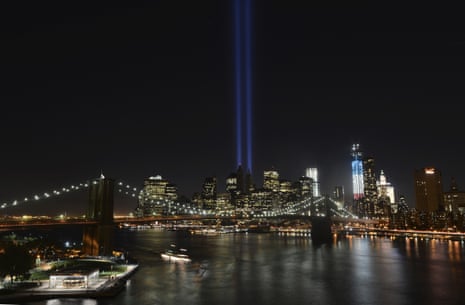
France is to propose that masks be worn in shared workspaces as the country grapples with a rebound in coronavirus cases that rose again in the past 24 hours to over 3,000.
Employment minister Elisabeth Borne said she would propose on Tuesday at talks with employer and union representatives that masks be compulsory in collective workspaces.
“A theme that appears in all scientific opinions is the value of wearing them [masks] when there are several people in a confined space,” Borne said in an interview with French newspaper Le Journal du Dimanche.
Doctors have increasingly called for masks to be required in the workplace while the HCSP, a body advising the government on health policy, issued a recommendation calling for masks to be compulsory in all common indoor spaces.
Mexico added back 52,455 jobs in August, president Andres Manuel Lopez Obrador said on Saturday, hailing the news as a sign of recovery after the country lost more than 1 million jobs in the formal economy due to the coronavirus pandemic.
“This is a good indicator ... We’re going to move ahead in spite of everything because we’re working in a professional manner,” he said in a video on Twitter, citing data from the Mexican Social Security Institute (IMSS) on employees registered with the institute.
IMSS said last week that 3,907 jobs were lost in July due to the pandemic, adding to 1.1 million jobs lost in the country between March and June, according to Reuters.
Mexico ranks third worldwide for most coronavirus fatalities, with a death toll of 55,908, and its economy is expected to shrink this year by as much as 10% or more.
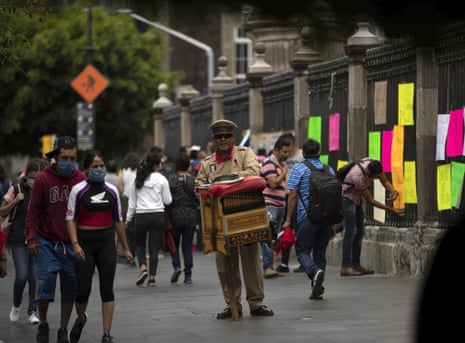
Sir Keir Starmer has warned Boris Johnson it is his duty to ensure schools in England reopen in September as planned.
Writing in the Mail on Sunday, the Labour leader said it was essential for the wellbeing and life chances of children that they were able to return to normal education next month.
“So, let me send a very clear message to the prime minister: I don’t just want all children back at school next month, I expect them back at school. No ifs, no buts, no equivocation,” he said.
“Let me be equally clear: It is the prime minister’s responsibility to guarantee children get the education they need and the benefit of being back with their teachers and classmates.
“My offer to help the government reopen schools still stands, but responsibility for making it happen lies squarely at the door of Number 10.”
Britain’s health secretary Matt Hancock will announce this week that Public Health England (PHE) will be scrapped and replaced by a new body specifically designed to protect England against a pandemic by early next month, the Sunday Telegraph newspaper reported.
Hancock will announce a merger of the pandemic response work of PHE with NHS test and trace into a new body, called the National Institute for Health Protection, the newspaper said.
The paper said the new body will become “effective” next month, although it will take until next spring to complete.
The Conservative peer and former TalkTalk telecoms boss Baroness Harding, who currently heads Test and Trace, is being tipped to lead the organisation, the paper said.
It quoted a senior minister as saying: “We want to bring together the science and the scale in one new body so we can do all we can to stop a second coronavirus spike this autumn.”
The reported move follows repeated reports over recent months that ministers have been unhappy and frustrated with PHE’s response to the coronavirus crisis.
A Department of Health and Social Care spokesman said: “Public Health England have played an integral role in our national response to this unprecedented global pandemic.
“We have always been clear that we must learn the right lessons from this crisis to ensure that we are in the strongest possible position, both as we continue to deal with Covid-19 and to respond to any future public health threat.”

The Emirati APEX National Investment company signed a “strategic commercial agreement” with Israel’s Tera Group to cooperate on research and development related to Covid-19, including a testing device.
The deal “is considered the first business to inaugurate trade, economy and effective partnerships between the Emirati and Israeli business sectors, for the benefit of serving humanity by strengthening research and studies on the Novel Coronavirus,” the UAE’s state news agency WAM said late on Saturday, quoting APEX’s chairman Khalifa Yousef Khoury.
The agreement was signed at a press conference in Abu Dhabi, coming soon after Israel and the UAE announced an agreement on Thursday that will lead to a full normalisation of diplomatic relations between the two states.
Mexico will need up to 200 million coronavirus vaccine doses, according to a senior government official.
The immunisation of its 120 million inhabitants could start as early as April if clinical trials and regulatory approvals for pharmaceutical firm AstraZeneca go as planned, Reuters reports.
In partnership with the governments of Mexico and Argentina, AstraZeneca initially plans to produce 150 million doses in early 2021 and eventually make at least 400 million doses for distribution throughout Latin America.
AstraZeneca is among those working on Covid-19 vaccine candidates around the world.
Mexico’s government has also said it is considering other options for bringing a vaccine quickly to its population, the second-largest in Latin America.
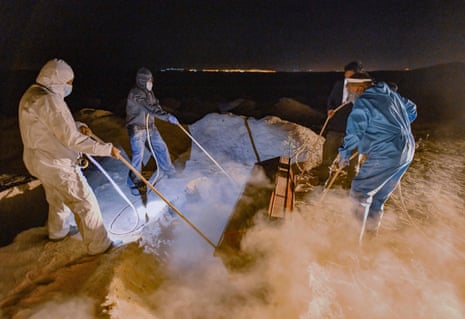
AstraZeneca will be able to produce between 30 and 35 million vaccines per month, Martha Delgado, a Mexican deputy foreign minister, told Reuters in an interview on Friday.
The vaccine could require two doses to be effective, Delgado said.
“If we need 200 million, we’re going to be vaccinating for a long time,” Delgado added.
Last-stage so-called Phase III trials are expected to conclude by November or December, after which AstraZeneca will seek government approvals if the vaccine is found to be safe and effective.
If that goes smoothly, Delgado estimated the first vaccines in Mexico could be administered in April.
Mexico’s death toll of 55,908 stands as the world’s third highest behind the US and Brazil. Latin America’s 6 million cases and more than 237,000 deaths make it the world’s hardest-hit region.
To ensure all Mexicans have access to a vaccine, the government of president Andres Manuel Lopez Obrador is in talks with other pharmaceutical laboratories in different stages of developing a vaccine.
“Astra’s production isn’t going to be enough for Mexico. We need to supplement that with a couple of more vaccines,” Delgado said.
Mexico’s government has completed memorandums of understanding with French drugmaker Sanofi, Johnson & Johnson’s Janssen unit, and Chinese companies CanSino Biologics Inc and Walvax Biotechnology Co Ltd.
CanSino and Walvax are interested in producing a vaccine in Mexico for delivery to the Latin American market.
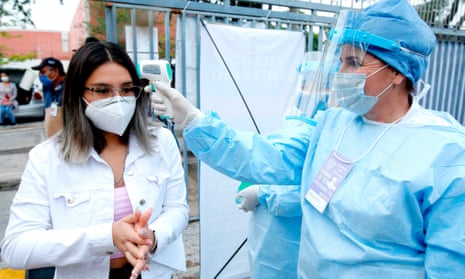
FDA approves use of new cheaper saliva Covid test
The US Food and Drug Administration on Saturday granted emergency use authorisation for Yale School of Public Health’s saliva test to detect Covid-19, after a trial on National Basketball Association players and staff.
SalivaDirect, the fifth saliva test approved by the FDA for the disease, requires no swab or collection device and uses spit from people suspected of having the coronavirus, the agency said.
FDA commissioner Stephen Hahn called the test “groundbreaking” in its efficiency and in being unaffected by crucial component shortages.
SalivaDirect is seen as a cheap, simpler and less invasive testing method that requires no extraction of nucleic acid and can use several readily available reagents.
The NBA has used the test in a programme involving asymptomatic players, coaches and staff from various teams after partnering with Yale in June, the school said in a separate statement.
“We simplified the test so that it only costs a couple of dollars for reagents, and we expect that labs will only charge about $10 per sample,” said Nathan Grubaugh, assistant professor at Yale School of Public Health.
The FDA said the test could lower the risk to healthcare workers as the sample is self-collected, under the observation of a healthcare professional.
Algeria started reopening its mosques, cafes, beaches and parks on Saturday for the first time in five months, gradually relaxing one of the world’s longer virus confinement periods.
Curfews remain in place in more than half the country, and masks are required outdoors as Algeria tries to keep virus infections down, the Associated Press reports.
But authorities decided to start reopening public places, saying the virus infection rate is believed to have stabilised.
Crowds packed beaches on Saturday in the capital, Algiers, celebrating the opportunity to swim in the Mediterranean Sea during the August heat.
Restaurants were also allowed to reopen, and mosques that can hold more than 1,000 people and ensure social distancing measures.
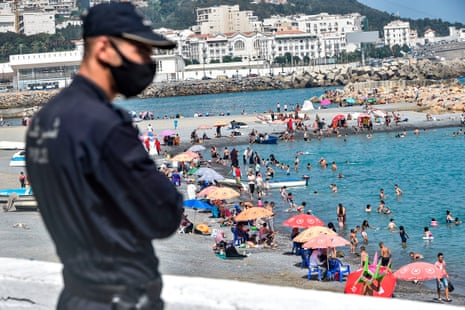
However, mosques remain closed to all women, children and the elderly until further notice, and the main weekly prayers on Friday will remain banned to limit crowds.
Mosque-goers must wear masks and bring their own prayer mats.
This reopening will depend entirely on the discipline of each person to respect protection measures, said the minister for religious affairs, Mohamed Belmahdi, who was among those attending the first services on Saturday at Khaled Ibn El Walid mosque in the resort town of Heuraoua, east of Algiers.
He warned that authorities would close mosques again if Algerians show even a slight indifference toward preventive measures.
“The health of citizens comes before faith,” he said.
Algeria has reported more than 37,000 virus infections and 1,350 deaths as of Friday, the third-highest death rate reported in Africa after South Africa and Egypt.
Greek authorities have announced 230 new coronavirus cases over the past day, 27 from international arrivals, the daily I Kathimerini reported.
There were also 3 new deaths.
Total Covid-19 cases in Greece now stand at 6,858 with 226 deaths.
There are 23 patients on ventilators, while 136 have recovered after having been treated in intensive care units.
The sharp rise in new daily cases in August, and local outbreaks coinciding with the late opening of the tourist season after two months of strict lockdown, have led the government to impose new social distancing measures and restrictions.
From Monday, bars, cafes and restaurants in many parts of the country, including the capital Athens, will have to close at midnight and not reopen before 7am.
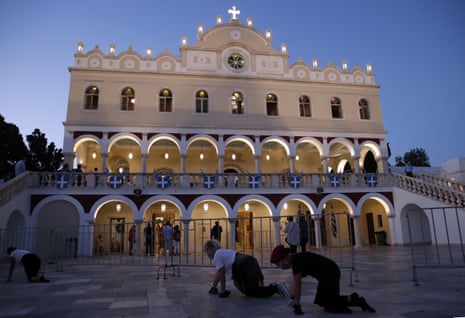
South African president Cyril Ramaphosa said on Saturday that all indications were that South Africa had reached the peak of Covid-19 infections, as he announced a sweeping removal of lockdown restrictions on the economy.
In a televised address, Ramaphosa said the government would end the ban on alcohol and tobacco, allow restaurants and taverns to return to normal business, subject to strict hygiene regulations, and remove the ban on travel between provinces.
“All indications are that South Africa has reached the peak and moved beyond the inflection point of the curve,” Ramaphosa said, adding that the cabinet had decided to move to lower, “level two” restrictions from midnight on Monday.
“The move to level two means that we can remove nearly all of the restrictions on the resumption of economic activity across most industries,” he said.
He said a fall in the infection rates, as well as people recovering, were “significantly reducing the pressure on our health facilities”, but he cautioned that cases could easily surge if people fail to maintain vigilance.
Restrictions on international travel remained in place, he said.
South Africa has more than half a million cases, but the rate of infections has declined over the past two weeks.

One person who tested positive for coronavirus in Wales has died, bringing the country’s total number of deaths since the beginning of the pandemic to 1,587.
Public Health Wales said the total number of cases in the country increased by 27, bringing the revised total of confirmed cases to 17,543.
Students in Saudi Arabian public schools will be educated via distance learning for the first seven weeks of the new school year, the country’s minister of education said on Saturday, as a precaution against the spread of coronavirus.
During that time, the situation for the remainder of the school year will be evaluated, Hamad bin Mohammed Al Shaikh said in remarks carried on the state-run al-Ekhbariya TV channel, according to Reuters.
University and technical schools will be online for theory-based curriculums and in person for practical curriculums, he added.
Saudi Arabia has seen more than 297,000 cases of coronavirus.